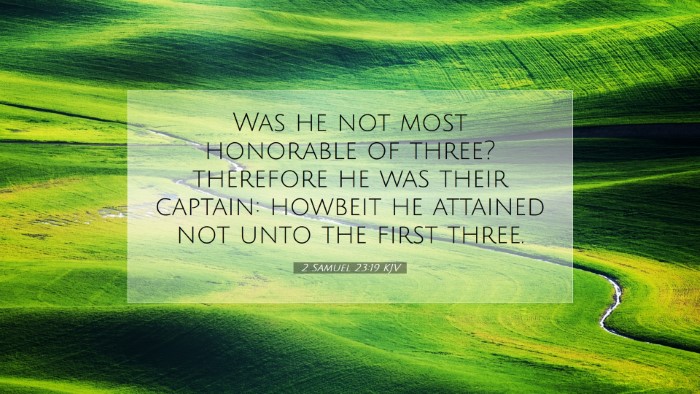Commentary on 2 Samuel 23:19
Verse Text: "Was he not most honorable of the three? Therefore he was their captain: howbeit he attained not unto the first three."
Introduction
The passage found in 2 Samuel 23:19 offers a glimpse into the character and deeds of one of David's mighty men, Abishai, who, while not part of the foremost three warriors, still held a significant and honorable stature in David's army. This commentary synthesizes insights from various public domain sources, especially focusing on the contributions of Matthew Henry, Albert Barnes, and Adam Clarke.
Contextual Background
This verse falls within a pericope that catalogs the exploits of David's “mighty men.” Understanding the historical and literary context is crucial for grasping the significance of Abishai's role among David’s warriors.
- Historical Context: The reign of David marked a period of consolidation and conflict, where mighty men like Abishai were vital in establishing and maintaining David’s kingdom. Abishai was known not only for his feats in battle but also for his loyalty to David.
- Literary Context: This section, often referred to as the "List of David's Mighty Men," presents a mixture of honorable mentions and summary statements, contrasting the three most valiant warriors with other significant figures.
Detailed Analysis
In 2 Samuel 23:19, we observe several critical themes relevant to both the historical context and moral lessons derived from the text.
1. The Honor of Abishai
Matthew Henry emphasizes that Abishai held considerable honor among the warriors, even if he did not reach the level of the three most distinguished heroes, his attributes and contributions were nonetheless significant.
Albert Barnes notes that in the eyes of his contemporaries, Abishai’s achievements merited him a leadership position, indicative of his abilities and reputation.
Adam Clarke suggests that one's honor is not solely based on the rank but on the respect they command and the deeds they accomplish. Abishai's courage, particularly in instances like slaying 300 enemies, brings light to his qualifications.
2. The Theme of Leadership and Rank
The verse alludes to the hierarchical structure within David's military. While position matters, it is the capability and the quality of leadership that truly matter.
- Pastoral Insight: This raises questions for church leaders regarding their criteria for evaluating leadership. Are pastors valuing achievements, deeds, and the hearts of their leaders over mere titles?
- Theological Reflection: Comparing Abishai’s honor with the first three mighty men can also lead to discussions on how God’s kingdom operates, favoring the humble and faithful over the merely powerful.
3. Loyalty and Relationships
The mutual respect and loyalty found among David’s mighty men provide rich material for reflection.
Abishai’s relationship with David was characterized by fierce loyalty, often putting himself in harm's way for the sake of the king. This illustrates the essence of Christian fellowship and mutual support in ministry.
Application for Today
For modern scholars and theologians, this passage underscores important principles of leadership, honor, and valor in the context of service to others.
- Service over Status: Abishai's story encourages contemporary leaders to prioritize acts of service over the pursuit of titles or prominence.
- Team Dynamics: It promotes the understanding that while some may take the lead, every member of the team plays a crucial role and contributes to the unity and effectiveness of the whole.
Conclusion
2 Samuel 23:19 stands as a tribute to those who serve faithfully behind the scenes. Abishai's life invites readers to reflect on their own roles in their respective communities, demonstrating that honor comes from dedicated service and the commitment to support others in achieving their collective goals.
The insights gleaned from this text are profound as they address not merely past historical realities but also contemporary responsibilities for all who aspire to be leaders, mentors, and faithful servants in God’s mission.


